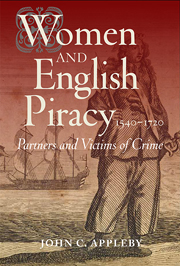Book contents
- Frontmatter
- Contents
- Maps and Illustrations
- Acknowledgements
- A Note on Conventions
- Abbreviations
- Introduction
- 1 The Rise and Fall of English Piracy from the 1540s to the 1720s
- 2 Pirates, Female Receivers and Partners: The Discrete Supporters of Maritime Plunder from the 1540s to the 1640s
- 3 Wives, Partners and Prostitutes: Women and Long-Distance Piracy from the 1640s to the 1720s
- 4 Petitioners and Victims: Women's Experiences from the 1620s to the 1720s
- 5 The Women Pirates: Fact or Fiction?
- Epilogue
- Bibliography
- Index
4 - Petitioners and Victims: Women's Experiences from the 1620s to the 1720s
Published online by Cambridge University Press: 05 October 2013
- Frontmatter
- Contents
- Maps and Illustrations
- Acknowledgements
- A Note on Conventions
- Abbreviations
- Introduction
- 1 The Rise and Fall of English Piracy from the 1540s to the 1720s
- 2 Pirates, Female Receivers and Partners: The Discrete Supporters of Maritime Plunder from the 1540s to the 1640s
- 3 Wives, Partners and Prostitutes: Women and Long-Distance Piracy from the 1640s to the 1720s
- 4 Petitioners and Victims: Women's Experiences from the 1620s to the 1720s
- 5 The Women Pirates: Fact or Fiction?
- Epilogue
- Bibliography
- Index
Summary
In 1614 Richard Daniel, a ship-master from Youghal, was seized with the rest of his company by pirates and sold into slavery. Four years later his wife, Ellen, received a licence from the Lord Deputy of Ireland, authorizing her to beg for two years, to support herself and five small children, while collecting money for his ransom. How she survived with such a burden is unknown. Like other women in similar situations, she may have received help from kin or neighbours, including support from parish relief which was supplemented by earnings from low-paid casual work as well as unlicensed begging. As in so many other cases involving the poor during this period, her life appears as a fleeting, fragmentary episode whose personal dramas and crises are veiled by a lack of evidence. Whether she was successful in recovering her husband from captivity is also unknown, though as the years passed the prospect of his return receded. Daniel's difficult circumstances formed part of a broader pattern experienced by thousands of women whose spouses, partners or sons were taken prisoner and enslaved by the Barbary corsairs, a hybrid collection of pirates and sea raiders operating from bases in the Mediterranean and North Africa. The scale of the problem provoked various solutions and remedies, some of which were profoundly revealing about wider attitudes towards women. The anonymous author of the ‘Seamen's New Year's Gift to the King’, of January 1636, glossed over the plight of women such as Ellen Daniel, arguing that prostitutes and others should be exchanged for male captives in Barbary.
- Type
- Chapter
- Information
- Women and English Piracy, 1540-1720Partners and Victims of Crime, pp. 129 - 188Publisher: Boydell & BrewerPrint publication year: 2013



